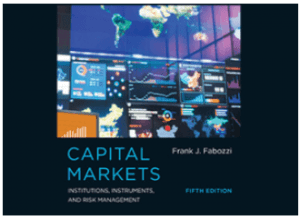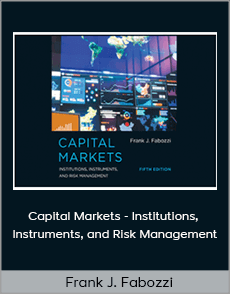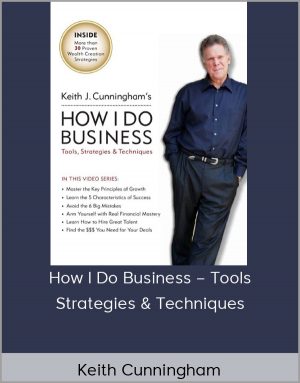Frank J. Fabozzi – Capital Markets – Institutions, Instruments, and Risk Management
$20.00
Also called online marketing, internet marketing is the process of promoting a business or brand and its products or services over the internet using tools that help drive traffic, leads, and sales.
SalePage
Frank J. Fabozzi – Capital Markets – Institutions, Instruments, and Risk Management

Check it out: Frank J. Fabozzi – Capital Markets – Institutions, Instruments, and Risk Management
The substantially revised fifth edition of a textbook covering the wide range of instruments available in financial markets, with a new emphasis on risk management.
Over the last fifty years, an extensive array of instruments for financing, investing, and controlling risk has become available in financial markets, with demand for these innovations driven by the needs of investors and borrowers. The recent financial crisis offered painful lessons on the consequences of ignoring the risks associated with new financial products and strategies. This substantially revised fifth edition of a widely used text covers financial product innovation with a new emphasis on risk management and regulatory reform. Chapters from the previous edition have been updated, and new chapters cover material that reflects recent developments in financial markets.
The book begins with an introduction to financial markets, offering a new chapter that provides an overview of risk—including the key elements of financial risk management and the identification and quantification of risk. The book then covers market participants, including a new chapter on collective investment products managed by asset management firms; the basics of cash and derivatives markets, with new coverage of financial derivatives and securitization; theories of risk and return, with a new chapter on return distributions and risk measures; the structure of interest rates and the pricing of debt obligations; equity markets; debt markets, including chapters on money market instruments, municipal securities, and credit sensitive securitized products; and advanced coverage of derivative markets. Each chapter ends with a review of key points and questions based on the material covered.
What is Internet Marketing?
Defining Internet Marketing
Also called online marketing, internet marketing is the process of promoting a business or brand and its products or services over the internet using tools that help drive traffic, leads, and sales.
Internet marketing a pretty broad term that encompasses a range of marketing tactics and strategies – including content, email, search, paid media, and more.
These days, though, internet marketing is often used interchangeably with “content marketing.”
Why?
Because content marketing is the internet marketing of the present and future.
Content Marketing Institute defines content marketing as:
“A strategic marketing approach focused on creating and distributing valuable, relevant, and consistent content to attract and retain a clearly defined audience — and, ultimately, to drive profitable customer action.”
Think of it like this: content marketing (or inbound marketing) is in direct opposition to traditional advertising (outbound marketing), and in direct integration with the patterns and habits of today’s generation.
We don’t like to be sold to, we have our ad-blockers on, and we barely watch cable anymore.
Content marketing serves up content that addresses our pain points, and is there when we want it.
Here’s a great illustration of that from Voltier Digital:
Content Marketing vs. Traditional Advertising
Here’s the evolutional pathway behind the modernized form of marketing that is most successful today.
Selling no longer works (a.k.a., traditional advertising).
Why?
Traditional advertising focuses on pushing messages at the consumer to get them to buy.
It’s interruptive, obstructive, and intrusive.
It shouts, “Hey, look at me!” while waving its arms.
You may try to avoid eye contact, but traditional ads are persistent.
You know what traditional ads look like because you’re bombarded with them every single day.
Think TV commercials, billboards, magazine ads, radio ads, and web banner ads.
Ads have been around for a long time, as evidenced by this traditional ad for “honest-to-goodness” coffee from the 1950s.
Headline: C3: The SEO & Content Marketing Conference. Join us at C3 Virtual on April 20-21 for strategic workshops, leadership sessions and industry panels — from anywhere. Register now.
Ads may still work in some strategic places.
But Internet users can just click away from ads if they don’t want to see them.
Which is exactly what happens.
According to a PageFair report, 615 million devices in use today employ ad blockers. Additionally, ad blocker use increased by 30 percent in 2016 alone.
You know it, I know it, everybody knows it.
Ads are annoying.
And, they aren’t the way consumers prefer to learn about new products anymore.
Instead of businesses shoving themselves in consumers’ faces, they need to take a different, gentler approach.
Content marketing is exactly that.
Brands and marketers who use it publish content that teaches, inspires, guides, or solves a problem for their target audience.
With some handy tricks, the targets can find that content on the web without it being pushed at them.
If the prospects gain something useful from the content, they’ll keep coming back for more.
Finally, consumers can interact with the brand organically and share their content on social media.
Authority is established.
Connections happen.
These loyal followers can then be converted into leads and sales – naturally.
All of the above happens with a focus on giving value to the user.
Help users – offer them value and they’ll reward you in return.
That is what internet marketing/content marketing is all about at its core.
Why Internet Marketing?
Now that you know what internet marketing is, you still may be wondering why there’s so much hype around it.
Well, the hype is totally founded.
Internet marketing has shown proven success over and over again.
Here are some stats gathered from around the web to help give you an idea of why internet/content marketing stands tall:
- By 2019, content marketing is set to be an industry worth $313 billion.
- 91 percent of businesses already are convinced of its power and have already adopted it as an essential marketing tactic.
- Content marketing costs 62 percent less than traditional, outbound marketing, but pulls in 3x as many leads.
- If you’re a small business with a blog, you’ll rake in 126 percent more lead growth than your competitors without a blog
- If you have a blog and publish content, you’re likely to get 434 percent more indexed pages on Google, on average
And there’s more.
From my own content marketing endeavors, I have seen my small business take off.














